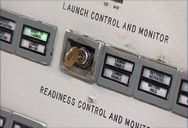Motivation
Deterrence: Bad Feelings Motivate Us More Than Pleasant Ones
Deterrence is strong motivation for diplomacy, credit cards, and personal choice
Posted April 29, 2014

Enough to destroy a continent.
I got a refresher course in deterrence during a visit to the Titan Missile Museum in Tucson, Arizona. Titan II was the largest nuclear missile the United States ever built. During the cold war, 54 of these six–story behemoths stood alert in underground silos.
The last remaining bunker in Tucson is massive, a marvel of 1960s engineering, and now a National Historic Landmark. In elementary school I went through air raid drills in which we crouched beneath our desks. At home I was responsible for keeping our basement bomb shelter stocked.
At the time the threat of nuclear annihilation was part of everyday life. The psychology of the cold war was basically one of deterrence. At 6,000 mph a missile took only 30 minutes to close the distance between Moscow and the United States. If either side fired first the other had time to retaliate, which it would because it had nothing to lose. The result, however, would be MAD—Mutually Assured Destruction, meaning nuclear winter and the end of civilization as we knew it.

Commander Fred explains the bomb.
Because neither side could hope to win such a contest, the principle of deterrence kept aggression at bay for 45 years. Today, psychological deterrence is at work whenever an action’s consequences are bad enough to outweigh any positive benefits.
For a long time we’ve known that we’re far more sensitive to negative feelings than to pleasant ones. In gambling language the rule of deterrence might be stated as, “The fear of losing outweighs the pleasure of gains.” The pain of loss is quantitatively about double the pleasure we experience from reward. The psychological name for this deterrence is “loss aversion.”
Loss aversion is not a flaw. Extensive research shows it to result from the very way our brain is structured. Once the evolving brain hit upon a really useful program it burned it down to the level of our DNA. Fear of loss is highly instructive, and error a powerful teacher, and so we learn not to court its pain. Because the brain monitors the outcome of its actions it learns from its mistakes. When asked what he learned from having made bad decisions, for example, Thomas Watson Jr. of IBM said, “Good judgment comes from experience. Experience comes from bad judgment.”

Me, during the tour.
In its simplest form deterrence is evident in the distinction between our quick and slow response systems, the reflexive one reacting before we have time to think while the slower one allows us time to reflect. The quick system makes us jump at the stick we thought was a snake because it is better to react quickly to potential danger than to pause and deliberate if what startled us is in fact dangerous. But the slow system can cause problems too by letting us ruminate on what might have better been over and done with.
Emotion evolved from homeostasis, the biological propensity of all living organisms to maintain a stable internal milieu. It nudges us back to a balanced midpoint. But emotions also evolved to enable us to decide quickly in life–and–death situations that our remote ancestors repeatedly faced. Just as Cervantes called proverbs “short sentences drawn from long experience,” emotions are shorthand summaries of the weighing operations that take place behind the scenes outside of awareness. As intelligent as emotion is, it carries ancient baggage not suited to modern challenges.
We are naturally averse to losing goods or status, which is why we do stupid things. Credit card companies magnificently exploit loss aversion and reward to make us feel one but not the other.
Consider a typical purchase to which you “treat” yourself. You watch the ads and monitor the websites, waiting for the price to drop to what you think is fair. Then you pounce. You experience the thrill of getting something right away while anesthetized to the pain of having to pay because payment is down the road. When you open the credit card statement and see the full amount owed plus finance charges that run about 20%, you lessen the sting by framing the reality in a favorable way: you “only” have to pay the “minimum amount.” Framed this way you shift the future loss—the money you still owe—to another mental bank account. And thanks to the way credit card companies have framed your obligation, you can give yourself permission to resume shopping.
When you do the math the savings you envisioned are illusory. By the time you actually pay off the statement, the stuff you thought was a steal has cost a great deal more than the sticker price. Neurologically, nothing has changed, and bad still outweighs good. Yet despite the fiscal consequences of racking up credit charges you will repeatedly fail to resist impulse purchases because your fear detector does not to kick in. Emotion cannot warn you, so you are at the mercy of temptation and advertisers.
The framing effect goes hand–in–hand with loss aversion. Identical bets play out differently depending on whether the gamble is framed as a loss or a gain. Supermarkets label hamburger 85% lean rather than 15% fat because they know that shoppers recoil from fat. Similarly, you’ll think twice about a medical procedure that has a 20% chance of killing you whereas your frame of mind will be different if counseled that the same procedure has an 80% chance of helping. Whether you say yes or no to anything depends on how you look at it. The best way is with open eyes.

In today’s temptation–filled world the only way to resist loss aversion and the framing effect is to tell yourself repeatedly that these forces are real and push you. Treating losses differently from gains is a genuine feature of how the brain engages the world.
Follow me @Cytowic, on Google+, Facebook, visit Cytowic.net, or read y book reviews at The New York Journal of Books.




